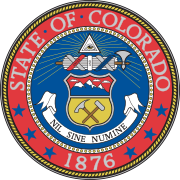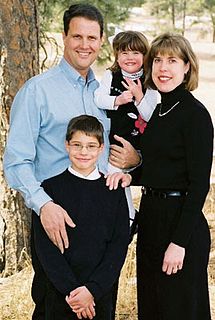
Colorado's 5th congressional district is a congressional district in the U.S. state of Colorado. The district lies in the center of the state and comprises Colorado Springs and its suburbs including Cimarron Hills and Fort Carson.

The 2006 Texas 22nd congressional district election for the 110th Congress was held on November 7, 2006, and attracted considerable attention because this district was represented by former House Majority Leader Tom DeLay, a prominent member of the Republican Party, who resigned after being indicted and subsequently winning the Republican primary. Because of Texas state law, Republicans, in order to hold on to the seat, would have had to win a write-in campaign, something that has only been done four other times in the history of U.S. Congressional elections.

Shelley Sekula-Gibbs is an American physician and a former member of the United States House of Representatives representing Texas's 22nd congressional district from November 13, 2006, until January 3, 2007. A Republican, she has also served as a city councilwoman in Houston, Texas for three terms, from 2002 to 2006. She won the special election to fill the 22nd Congressional seat on November 7, 2006, for the remaining weeks of the 109th United States Congress. On the same day, she also lost in the general election for that seat in the 110th United States Congress. Thereby she was in the interesting position of being a lame duck the moment she was elected. In the 2008 campaign for the Republican nomination in the 22nd Congressional District, she finished first in the initial primary, but lost in a runoff to Pete Olson.

The Arizona 8th congressional district election, 2006 was an election for the United States House of Representatives for the open seat of incumbent Jim Kolbe (R), who was not running for re-election. The primary was held on September 12, 2006, and the two major party winners were Republican Randy Graf, a former state Representative who challenged Kolbe for the GOP nomination in 2004, and former State Senator Gabrielle Giffords. Libertarian Dave Nolan, who was uncontested in the primary, was also in the November 7, 2006 general election. Graf was considered too conservative for the district: Kolbe withheld his endorsement, and towards the end of the election the National GOP pulled their support. By election time, most non-partisan analyses considered this race the most likely district to switch hands, which it did, as Giffords won a decisive victory, 54% to 42%.

Minnesota's 5th congressional district election, 2006 was an election for the United States House of Representatives for the open seat of incumbent Martin Olav Sabo (DFL), who retired after serving the Minneapolis-based district for 28 years.

The 2006 California 11th congressional district election was an election for the United States House of Representatives in California's 11th congressional district. The two major party candidates were longtime Republican incumbent Richard Pombo and Democratic challenger Jerry McNerney. Both faced serious challenges in their respective primaries, on June 6, 2006.

The 2006 Nevada 2nd Congressional District Election was held on November 7 to elect a representative from the Nevada's 2nd congressional district, which covers all of Nevada outside Clark County, and some parts of Clark County. Republican Party candidate Dean Heller won the election. It was an open seat because the incumbent, Republican Jim Gibbons, made a successful run for governor.

The Arizona 1st congressional district election, 2006 was an election for the United States House of Representatives. The two main candidates were two-term Republican incumbent Rick Renzi and Democratic civil rights attorney Ellen Simon. Renzi defeated Simon by a 52% to 44% margin.

The 2006 United States House of Representatives elections in Colorado were held on November 7, 2006, with all seven House seats up for election. The winners served from January 3, 2007 to January 6, 2009.

The Nevada congressional elections of 2006 took place on November 7, 2006 when each of the state's three congressional districts elected a representative to the United States House of Representatives. Although President George W. Bush captured the state in both the 2000 and 2004 elections, he did so with a very slim margin. Nevada was considered a battleground state due to the close victory margins.

The 2008 congressional elections in Colorado were held on November 4, 2008 to determine who will represent the state of Colorado in the United States House of Representatives, coinciding with the presidential and senatorial elections. Representatives are elected for two-year terms; those elected served in the 111th Congress from January 6, 2009 until January 3, 2011.

On November 7, 2006, New York, along with the rest of the country held elections for the United States House of Representatives. Democrats picked up 3 House seats, the 19th, the 20th, and the 24th.

The 2006 United States House elections in Pennsylvania was an election for Pennsylvania's delegation to the United States House of Representatives, which occurred as part of the general election of the House of Representatives on November 7, 2006.

The 2012 United States House of Representatives elections in Colorado were held on Tuesday, November 6, 2012 to elect the seven U.S. Representatives from the state, one from each of the state's seven congressional districts. The elections coincided with the elections of other federal and state offices, including a quadrennial presidential election. Primary elections were held on June 26, 2012.

The 2014 United States House of Representatives elections in Colorado will be held on Tuesday, November 4, 2014 to elect the seven U.S. Representatives from the state of Colorado, one from each of the state's seven congressional districts. The elections will coincide with the elections of other federal and state offices, including Governor of Colorado and U.S. Senator.

Owen Hill is a state legislator for the U.S. State of Colorado. Elected to the Colorado State Senate as a Republican in 2012, Hill represents Senate District 10, which encompasses Eastern Colorado Springs.

The 2018 United States House of Representatives elections in Colorado were held on November 6, 2018, to elect the seven U.S. Representatives from the state of Colorado, one from each of the state's seven congressional districts. The Republican and Democratic Party primaries in Colorado were held on June 26, 2018. The elections coincided with the gubernatorial election, as well as other elections to the House of Representatives, elections to the United States Senate and various state and local elections.



















